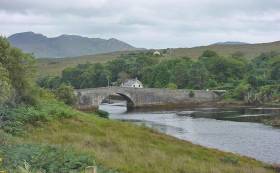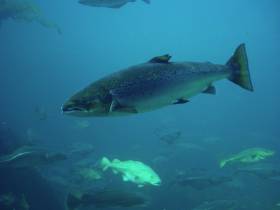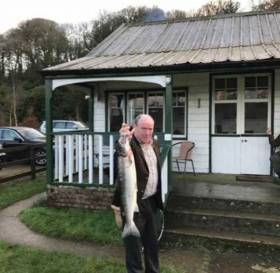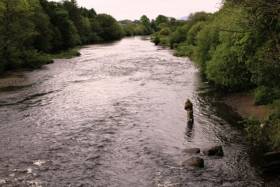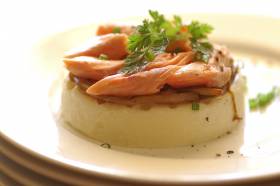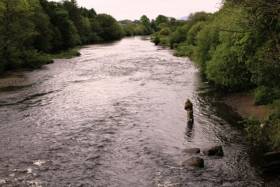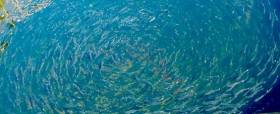Displaying items by tag: Salmon
Innovative Fish Counter Opens On Donegal’s River Lackagh
#Angling - Sean Kyne TD, Minister of State with responsibility for Inland Fisheries, has officially opened a new fish counter facility in the designated spring salmon fishery on the River Lackagh.
The project, which was devised and delivered by Inland Fisheries Ireland, was completed in recent months and will provide important data for the future management of spring salmon, grilse and sea trout stocks for the River Lackagh catchment, which incorporates Lough Beagh, situated in Glenveagh National Park.
This major infrastructural project, which was funded under IFI’s Salmon Conservation Fund, includes installation of a crump weir, Logie fish counter and access road to the Lackagh River at Creeslough, Co Donegal.
The counter will provide verifiable, accurate data on the size, duration and timing of fish migration through the fishery.
The River Lackagh counter project was developed by IFI in response to closure of the River Lackagh salmon fishery in 2007, when scientific advice indicated that salmon stocks had fallen to below their conservation limit.
The salmon fishery remained closed to enable fish stocks re-build until 2013 when electrofishing surveys confirmed that juvenile salmon stocks had recovered sufficiently to allow for the re-opening of the salmon fishery on a ‘catch and release’ basis.
IFI says the new counter will be a valuable addition to its national suite of index counters and represents the organisation’s first counter on the north Donegal coast.
Minister Kyne said he is “delighted to officially open this fish counter which will help protect fish stocks in the area. Angling is a valuable asset to local communities here in Donegal. This development will help us ensure the sustainability of fish populations for future generations.”
IFI chief executive added: “This fish counter provides real time data on fish stocks in the fishery and allows us to adapt to changing stock levels. This is crucial both from a conservation and economic viewpoint as this fishery contains valuable wild fish populations.
“I would like to acknowledge all our partners in this project who recognised the importance of this project and worked with us to delivery this facility for the local area.”
Angling in Ireland currently contributes €836 million to the Irish economy annually, supporting upwards of 11,000 jobs which are often in rural and peripheral communities.
IFI’s National Strategy for Angling Development aims to ensure the sustainable development of the natural angling resource in a conservation focused manner. If realised, the strategy could help increase the economic contribution of angling by €53 million annually and support 18,000 jobs.
IFI collaborated with several partners on the River Lackagh project including Donegal County Council, the National Parks and Wildlife Service (NPWS) and ESB Networks. IFI also acknowledges the assistance of Creeslough & District Angling Association, owners Hillary Keegan and John Coyle and service providers WD Buchanan & Co Ltd, H Harkin Plan Hire Ltd and Source Civil Ltd.
Driftnet Ban No Protection For Wild Salmon, Conference Hears
#Fishing - Ireland’s stocks of Atlantic wild salmon are in a “serious position” due to the failure of the driftnet fishing ban to stem their decline.
That was the grave message from the annual Salmon Watch Ireland conference in Galway this past weekend, as The Irish Times reports.
Inland Fisheries Ireland chief executive Dr Ciaran Byrne added that conservation measures put in place a decade ago “don’t seem to have worked” as survival rates of salmon returning to Ireland’s rivers have fallen from 20% in 1980 to just 5% today.
Among the factors contributing to this decline, says Dr Byrne, are the impact of fish farming, by-catch from fishing trawlers, and climate change.
Research into the latter by Dr Ken Whelan suggests it has caused an “alarming” rise in salmon dying at sea, prompting stocks to move further north away from Ireland – and ultimately threatening the extinction of Irish salmon.
The Irish Times has much more on the story HERE.
Galway Man Convicted of Poaching Offence
At a sitting of Galway and District Court on the 7th of February 2017, Judge Mary Fahy convicted Mr. Gerry Farragher of Rinnaharney, Annaghdown, Co. Galway, for the illegal use of a net to catch salmon, in breach of Section 96 of the Fisheries Act, 1959. Mr. Farragher pleaded guilty to the charge in court.
Solicitor Dioraí Ford, representing Inland Fisheries Ireland, outlined the facts of the case. Mr. Ford explained that Fisheries Officers had found the net in question on Lough Corrib at 3.10am on the night of the 5th of July, 2016. The officers lay in wait until 11.25am when Mr Farragher approached the area and serviced the net by wading from the shore to an island. On leaving the area he was apprehended by the Fisheries Officers on duty.
Mr. Farragher told the Judge that it was only a small bit of net on his own land however Judge Fahy disagreed, commenting that wild salmon are very scarce these days. She also pointed out that it would be cheaper to visit a restaurant to eat salmon rather than paying fines in court.
Judge Fahy heard that Mr. Farragher had been convicted and fined in 2014 for netting and taking salmon from the same area. Mr. Farragher confirmed that he had paid his previous fines, and the judge stated that if he persisted in this activity, a prison sentence would be considered if he appeared before the court again.
Mr. Farragher was fined €500 plus costs of €600 and given six months to pay while the net in question was forfeited.
Dr Ciaran Byrne, CEO of Inland Fisheries Ireland said: “Lough Corrib is one of Ireland’s renowned angling destinations, known for its wild brown trout and salmon fishing. It is a shame to see individuals continuing to illegally fish the area, an action which is essentially an environmental crime.
We are delighted with the outcome of this case which highlights that those who are caught will be held accountable. Our Fisheries Officers patrol the waterways in overt and covert operations with a view to protecting the wild fish populations in this area.”
First Salmon of 2017 Caught in Cork
The first salmon of 2017 has been caught in the Careysville Fishery on the Munster Blackwater on the opening day of the river, according to Inland Fisheries Ireland. Angler Ronan O’Connor caught a fresh run salmon on Wednesday, 1st of February in Fermoy, Co. Cork.
The salmon, which weighed 7lbs, was confirmed as the first salmon caught in 2017 by Inland Fisheries Ireland today. The fish was caught while the river was high with around two foot visibility at 4pm on Wednesday. O’Connor’s success followed a morning of stormy weather which cleared slightly before he managed to catch the elusive salmon.
Ciaran Byrne, CEO of Inland Fisheries Ireland said: “The 2017 fishing season has commenced in earnest now and we are delighted that the first salmon of the New Year has been caught. Ireland is known as an angling destination across Europe as a result of its indigenous wild fish populations and impressive scenery. With over 273,600 domestic anglers in Ireland, Ronan O’Connor did extremely well to secure the title for catching the first fish of 2017.
We look forward to growing angling participation in Ireland even more this year. Our fisheries resource is hugely valuable and offers rural communities sustainable tourism and job opportunities outside of the traditional tourist seasons. We will continue to work with these communities to develop our angling infrastructure and improve access with a view to increasing angling participation and growing local economic growth as a result.”
Anglers looking for fishing information in Ireland in 2017 can visit www.fishinginireland.info for the latest news and fishing reports. For those looking to try out fishing for the first time, Inland Fisheries Ireland will run a number of Education and Outreach initiatives throughout the year.
Salmon Angling Drought Finally Ends As Ireland Sees First Catch-Free January On Record
#Angling - Angling enthusiasts fear for the health of Ireland’s salmon stocks after the first ever catch-less January since records began, according to the Belfast Telegraph.
Dubliner Ronan O’Connor landed Ireland’s first salmon of 2017, a seven-pounder, on the Blackwater in Cork in recent days – over a month since the season began on open rivers across the island.
Towards the end of January, Belfast Telegraph angling correspondent Vic Thomas said the situation was “worrying” and “puzzling”.
"About five years ago the first fish was always caught on the first day in January - it is unusual,” he noted.
Thomas’ concerns have been echoed by River Downes Fishery owner Shane Gallagher, who added that “it is difficult to remain optimistic about the future of Irish salmon angling when more than half our rivers are closed to anglers and salmon licence sales have almost halved since 2002.”
The Belfast Telegraph has more on the story HERE.
Trout Takes On Salmon For Crown Of Ireland’s Fish Counters
#Seafood - A Howth-based seafood company is hoping to broaden Irish people’s taste for fish beyond the usual salmon, as TheJournal.ie reports.
Winners of the recent BIM National Seafood Award for Innovation in Seafood Processing, Oceanpath teamed up with Goatsbridge Trout Farm in Thomastown, Co Kilkenny seven years ago, seeing opportunity in an underdeveloped market for Irish trout.
The key, according to Oceanpath’s commercial director Ken Ecock, was to come up with a product that adhered to the same qualities that people expect from their salmon fillets: reasonably priced, easy to cook, and free of bones.
Supermarket promotions to demonstrate the taste, as well as quick and easy recipes and products such as smoked trout and even pate, have also helped the Irish public gradually come round to a homegrown fish that’s usually imported from elsewhere in Europe to our fish counters.
And as salmon prices rise over high demand and supply challenges, the trout option is growing ever more attractive for the Irish fish supper.
TheJournal.ie has more on the story HERE.
Cork Brothers Convicted Of Illegal Salmon Fishing
#Angling - Two Cork brothers have been convicted of stroke hauling a salmon last August in breach of Section 170 (1) of the 1959 Fisheries Act last August.
At a sitting of Clonakilty District Court on 3 January, Judge David Waters imposed fines of €750 and costs of €500 each on Niall and Lawrence Fitzpatrick over the incident at Goose Pond on the Argideen River in Co Cork on 1 August 2016.
The charges had been vigorously contested by the brothers, but Judge Waters convicted the men and remarked upon the “unwarranted and unfounded allegations” made against Inland Fisheries Ireland’s fisheries officers who gave evidence in court.
The brothers had accused the fisheries officers of lying to the court, claiming that they had caught the salmon by fly fishing and that the fish had “swallowed the hook”.
After hearing evidence from the fisheries officers in regard to marks on the fish, Judge Waters was satisfied that the fish had in fact been stroke hauled, a mechanism by which a weighted instrument or device is used to foul-hook the fish.
Sean Long, director of the South West River Basin District, said following the verdict: “Ireland’s wild indigenous fish populations must be protected and conserved for future generations. This is an extremely valuable resource which makes a significant economic contribution to the local economy through angling tourism.
“This court case sends a clear message that illegal fishing activity will not be tolerated in Cork. Our fisheries officers are committed to protecting this resource for the public through overt and covert surveillance operations and we will continue to hold those who carry out illegal activity, which damages our resource, accountable.”
River Slaney Salmon Ban Angers Gorey Anglers
#Angling - Gorey anglers have expressed ‘outrage’ over the closure of the River Slaney for salmon fishing in 2017, as the Gorey Guardian reports.
Minister of State Seán Kyne said the move was made to help replenish and conserve stocks in the Wicklow and Wexford river, where worms for bait and barbed hooks have also been prohibited for the coming year.
But Slaney River Trust members have hit out at the ban, suggesting that the absence of even catch-and-release fishing for salmon will see angling numbers decline and encourage poaching on what’s a significant resource for the South East.
73 rivers have been approved to open for salmon angling this year, as previously reported on Afloat.ie — though that figure is nine fewer than those opened to full angling or catch-and-release in 2016.
The Gorey Guardian has more on the story HERE.
Mayo Man Convicted Over Illegal Angling Incident At Cloongee Fishery
#Angling - A Mayo man has been convicted of obstructing a fisheries officer and failing to produce a salmon licence over an incident on the River Moy.
At a sitting of Castlebar District Court on 3 January, Judge Mary Devins imposed fines totalling €600 on David Egan of Claremorris.
Inland Fisheries Ireland (IFI) brought the case against Egan when he was found fishing a section of the Cloongee Fishery on the River Moy in the Pollagh area and was not in possession of a valid permit or salmon angling licence.
Solicitor Dermot Hewson, acting on behalf of IFI, outlined the facts of the case against Egan and his refusal to hand over his fishing gear. No defence was offered by Egan, who pleaded guilty to both charges.
IFI’s ownership of the fishing rights on the Pollagh section of the Cloongee Fishery, near Foxford, was disputed previously but was confirmed at a special sitting of Castlebar Circuit Court in 2012.
The fishery was purchased from the private owners by the former North Western Regional Fisheries Board on behalf of the State in 2005.
IFI chief executive Dr Ciaran Byrne said: “The regulation of angling on the River Moy is imperative if we are to effectively conserve and protect this valuable resource.
“Incidents of obstruction of Fisheries Officers have become quite common and this court case sends a clear message that this will not be tolerated.
Dr Byrne added that the Cloongee Fishery “is well known as a very productive salmon fishery and Inland Fisheries Ireland has ensured that permits are available locally at a reasonable cost. The fisheries resource offers huge value from both a recreational and economic perspective to the local community.
“Inland Fisheries Ireland will continue to apprehend those who carry out illegal fishing activity.”
Inishturk Fish Farm Application Tops €200k
#FishFarm - Bord Iascaigh Mhara (BIM) has spent over €200,000 on its application for a proposed salmon farm off Inishturk in Co Mayo, as the Irish Examiner reports.
The planned project, much like the withdrawn proposal for Galway Bay for an even larger-scale fish farm, has faced opposition from local anglers and conservationists, who have lambasted the €216,000 spend — on an environmental study, legal advice and communications consultancy — as a ‘waste’ of taxpayers’ money.
“It is appalling that BIM has wasted more than €216,000 on a salmon farm licence application for Inishturk when it should be the salmon farm operator who is required to apply,” said Billy Smyth of lobby group Galway Bay Against Salmon Cages.
BIM, the State agency for Ireland's sea fisheries and aquaculture, says the Inishturk project could produce 4,000 tonnes of farmed salmon annually, and create as many as 75 direct and indirect jobs.
The Irish Examiner has more on the story HERE.



























